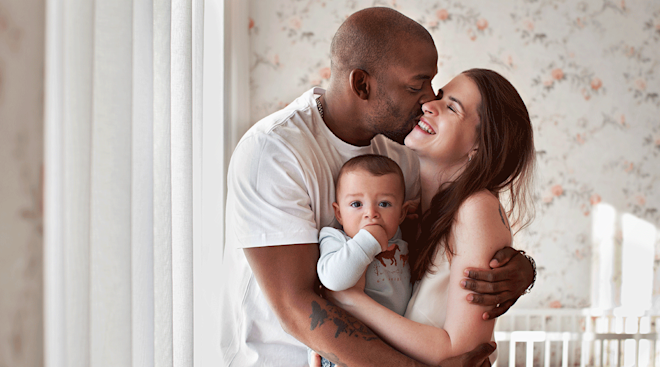A Guide to Starting a Family Through Platonic Co-Parenting
The concept of co-parenting isn’t anything new. Many separated or divorced couples choose to create or maintain a family dynamic for the sake of their children, even though they’re no longer romantically involved. But the idea of platonic co-parenting—aka proactively starting a family and raising a child with someone you don’t have a romantic or sexual history with—is a bit more novel.
There are lots of different paths to parenthood, and platonic co-parenting is one road you can explore. But while sharing kid-related responsibilities with a friend may sound like a win-win situation, establishing a parenting partnership comes with its own unique set of challenges. Curious if this type of family makeup is right for you? Read on to learn what platonic co-parenting involves.
It has a lot of different names: Platonic co-parenting is also referred to as elective co-parenting, intentional co-parenting and conscious co-parenting. Whatever you call it, it’s all about making a choice to start a family with someone based on a joint commitment to sharing the emotional, physical and financial aspects of raising a child without romantic involvement or marriage.
Along with egg and sperm donation, platonic co-parenting is on the rise in the LGBTQ+ community. But it’s also becoming more common among heterosexual singles. “We’ve seen a seismic shift in how people define family,” says Ivan Fatovic, founder and CEO of the “mating app” Modamily, which bridges the dating and fertility industries.
The family structure can vary quite a bit with platonic co-parenting. Often, longtime friends of opposite gender identities embark on a parenting partnership together—for example, a straight parent and an LGBT parent. (Of course, friends of the same gender identities can also choose to co-parent.) Sometimes, strangers meet and consciously build a platonic relationship with the specific intention of starting a family.
Structuring a family in this new, thoughtful way is still based on building a bond—albeit one with a different kind of chemistry. “Although there may not be romance involved, many opt to have children with their friend because it’s a relationship that allows for love, intimacy and a deep connection,” says Michelle Felder, LCSW, founder of Parenting Pathfinders, an online support service for parents and caregivers.
Suffice it to say that elective co-parenting isn’t something to rush into. Remember, you’re committing to a lifetime of raising a child with your co-parent. “You’ll want to start by having open and honest conversations about who you are and what your hopes are for your child and family,” Felder suggests. Of course, that’s just the jumping off point; next, you’ll need to hash out the nitty-gritty details.
The logistics of co-parenting
Since romantic love isn’t part of the equation, co-parenting offers more personal independence, but it also calls for a greater commitment to outlining responsibilities upfront. Platonic co-parenting is not a magical solution to utopian parenthood. People are complex and nuanced—and parenting, in and of itself, is an unpredictable rollercoaster. Felder emphasizes that you have to talk through the logistics and align on issues such as finances, lifestyle choices, religious beliefs, political leanings, vaccine stances and more. “Lay it all on the table and don’t hold back,” he says. “This step in the process can really solidify whether you’re compatible and if creating a family together suits you both.”
Of course, you’ll also want to lay out expectations in terms of custody and time shared together and apart with your child. Another big question: Where will you live? Will you keep two separate households or remain under one roof? Talk through the potential arrangements—or consider pooling resources so you can both maximize time with your child.
Hurdles will pop up along the way in your co-parenting journey, but being proactive in the planning stage will help set you up for more successful outcomes.
Hypothetical situations
You need to be ready to expect the unexpected. Talking through hypotheticals now can save you trouble later, in the event of potential plot twists. Perhaps your co-parent will have an incredible job opportunity in a different state or country. Maybe one of you will fall in love and want to get married. How will you and your co-parent handle these changes? Are you both willing to be flexible?
Alternatively, it’s important to know that a “platonic divorce” is an option. “If you’re not working well together anymore, you can divide custody and support like divorced couples,” says Amira Hasenbush, JD, MPH, a family formation lawyer in Los Angeles who focuses on working with LGBTQ+ families and non-traditional families. However, “Once you have a child together, you’re attached to the child for life.”
Options for conceiving
Figuring out how to bring a new baby into the world together is one of your earliest co-parenting decisions. Per Modamily’s web site, there are several common options prospective co-parents turn to. For starters, there’s natural conception (aka sex). Of course, if that’s not an option for you and your co-parent, artificial insemination may be the next step. With Intrauterine Insemination (IUI), a male co-parent’s sperm (or donated sperm) is placed in a female co-parent’s uterus close to the fallopian tube to encourage fertilization. In vitro fertilization (IVF) is a more involved process you might also consider. In this instance, a woman’s eggs—or those of a donor—are fertilized in a lab by a male co-parent’s sperm (or donor sperm). Surrogacy and adoption are also options to consider.
Communication is key—but talking about your approach to co-parenting will only get you so far. You’ll also want to establish things from a legal perspective. Unlike a donor, who has no legal parental or financial responsibilities, a co-parent should be defined at conception. Depending on how your child is conceived, establishing parentage and/or adoption is of particular importance.
Work with a lawyer who understands complex parentage across state lines. “You want to have proof of intent going into co-parenting,” says Hasenbush. “If you can, get a judgment after your second trimester to solidify who the parents are. If anything were to happen to the biological parent, without said judgment, the child could end up in custody of the next of kin, instead of the surviving co-parent.” Additionally, if future co-parents don’t have a long, pre-existing relationship as friends, both should undergo background checks and confirm that any prior marriages are fully dissolved. “If someone is separated but not divorced, the [legal] presumption could be that the spouse would be a parent,” Hasenbush says.
Beyond establishing the initial legal framework of your parenting partnership, you’ll want to lock in other important legal details: Draft a will, allocate distribution of assets like stocks and inheritance, determine financial responsibilities and health insurance and maybe even start a joint savings account for your child. Having this paperwork signed, sealed and delivered will ensure that you, your co-parent and your child are all financially protected. Co-parenting is not for everyone. But if you decide to embark on this journey with a friend—new or old—you’ll need to lay out expectations and boundaries for the sake of your future child. There will be bumps along the road, but approaching challenges as a cohesive team will keep your family dynamic strong.
About the experts:
Ivan Fatovic is the founder and CEO of Modamily, a dating and co-parenting app that bridges the dating and fertility industries. He is a stepdad and lives in Los Angeles.
Michelle Felder, LCSW, MA, is a licensed social worker, play therapist and founder of Parenting Pathfinders, an online support service for parents and caregivers. She received her master’s in Social Work from New York University and a master’s in child development from Sarah Lawrence College.
Amira Hasenbush, JD, MPH, is a family formation lawyer and founder of All Family Legal in Los Angeles. She focuses on working with LGBTQ+ families and non-traditional family units and is a member of the National LGBTQ+ Bar Association’s Family Law Institute as well as the Society for Ethics in Egg Donation and Surrogacy.
Please note: The Bump and the materials and information it contains are not intended to, and do not constitute, medical or other health advice or diagnosis and should not be used as such. You should always consult with a qualified physician or health professional about your specific circumstances.
Plus, more from The Bump:
Navigate forward to interact with the calendar and select a date. Press the question mark key to get the keyboard shortcuts for changing dates.




















































